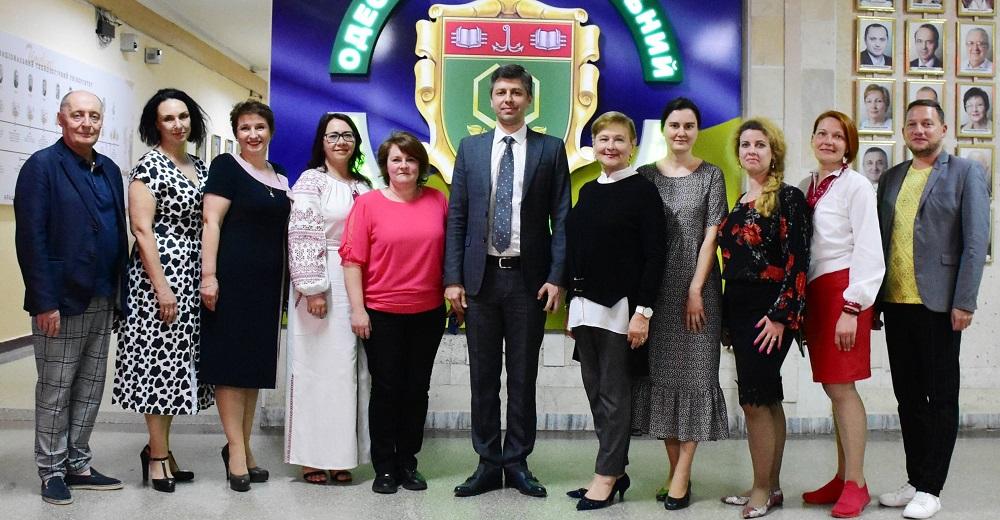Evaluation criteria
Assessment of knowledge of applicants is carried out according to
PROVISIONS ON THE ORGANIZATION OF THE EDUCATIONAL PROCESS ONTU
Each module of the discipline is evaluated by 100 points. The module is considered positively evaluated, if received 60 – 100 points. According to the rating system of knowledge evaluation, each module is evaluated based on theoretical and practical training (laboratory, practical, seminar classes) and performing independent work.
Criteria for evaluating the knowledge of applicants
- Work in laboratory/practical classes
When working with a separate group or subgroup of students in laboratory/practical classes, when work requires the activity of everyone, the difference between those, who wants to learn as much as possible, not only to actually acquire knowledge, but be able to use them to solve practical problems, becomes more noticeable. When certain practical tasks are performed by a small group of people, it, on the one hand, contributes to that, that when assigning responsibilities to the task, solving it at a sufficiently high level involves all members of the group without exception. And thus they acquire skills to work collectively. On the other hand, a leader always appears in such a situation, which, in turn, acquires the skills of a lower level manager. A certain plan of action is drawn up before the work is carried out, after its completion, the results are summarized and discussed together with the teacher. This contributes to the development of the ability to think independently, plan your actions, based on the knowledge gained during mastering the discipline, explain and defend your opinion. In this case, the assessment of everyone's activity depends, First, from the ability of the group to solve the task, secondly, from the ability to give certain explanations when defending one's point of view. The role of the leader is also taken into account, who gets higher scores.
The total number of points for this type of work is close to 15 %.
|
Distribution points, % |
Evaluation criterion |
|
11 – 15 |
The student shows deep knowledge, clearly, competently, logically and consistently justifies his opinion, has alternative views on the possibilities of solving the given problem, shows leadership qualities |
|
6 – 10 |
The student independently solves the given task, but is not always able to analyze and generalize the result, demonstrates an above-average knowledge of the curriculum material with a few minor errors, which do not significantly affect the final result. |
|
0 – 5 |
The student is able to work, performing a separate task, however, he is incapable of independent planning of actions in this direction, he has difficulties in analyzing the obtained results. |
- Independent work
A certain part of the material, which is not considered in lectures, the student learns independently. Usually, this is easy to understand material, but necessary for a holistic view when considering individual sections of the discipline. The teacher monitors the availability of the appropriate synopsis and, taking into account whether the essence of individual issues is reflected, scores points.
Their total number is close to 10 %.
|
Distribution points, % |
Evaluation criterion |
|
8 – 10 |
The student showed deep knowledge, clearly, competently, logically and consistently formulates answers to questions, fully covers the problem. Explaining the answer, gives successful examples. |
|
4 – 7 |
The student uses terminology freely, competently and to the point explains the answers to the questions, gross mistakes are not allowed when answering them, however, it does not fully reveal the content |
|
0 – 3 |
A student, does not teach the material consistently, in a too concise form, with some inaccuracies in wording and terminology |
- Individual work
These are separate tasks, which each student receives personally. They can be compiled in the form of abstracts, individual questions, direct answers to which cannot be found in information sources, certain calculation problems, tasks, the implementation of which requires conducting some experimental studies. When evaluating such work, the teacher takes into account not only the actual performance of such a task, but the ability to provide the necessary explanations, reasonableness of the answer.
The total number of points is approx 25 % from the total amount
|
Distribution points, % |
Evaluation criterion |
|
18 – 25 |
The student demonstrates skills in working with information sources, including foreign ones, the ability to generalize the received information and formulate questions, the research of which is relevant. The student is able to make an informative report, based on the prepared presentation, demonstrates mastery of the material when answering questions, erudition. |
|
8 – 17 |
The student is able to make a report, which demonstrates his awareness of the problem and directions for its solution, however, the answers to the questions are not always sufficiently complete and to the point. |
|
0 – 8 |
When preparing the material, in particular, the student's essay and presentation are assumed to contain inaccuracies, the report is not consistent, the answers to the questions are not sufficiently complete and thorough.. |
- Modular control work
The most common variant of modular control work is a set of test tasks, which is usually not superior 50. If it is assumed to find two correct answers to the question, the calculation of points for each test task takes this point into account. In addition, more difficult test tasks, essential for mastering the discipline, are evaluated with higher scores. That is, there is a certain ranking here. Sometimes the teacher considers it expedient to include open tests in the modular control work, they are usually rated higher.
The total maximum number of points for the module test is approaching 50 % from the total amount.
|
Distribution points, % |
Evaluation criterion |
|
34 – 50 |
The student has deep knowledge, fully covers the problem; clearly, competently, logically and consistently formulates answers to open test tasks |
|
17- 33 |
The student demonstrates thorough knowledge of the discipline, able to solve complex tasks, however, a certain amount of error is assumed, which slightly lower the overall score. |
|
0 – 16 |
The student demonstrates the level of knowledge, which allows you to orient yourself in the material in general, but mistakes are made when answering questions, inaccuracies |
|
Distribution of points for individual test tasks |
Evaluation criterion of test tasks |
|
to 10 |
Open tests - full, specific, thorough answer |
|
2 |
Closed tests, which contain complex, fundamental questions for this topic |
|
1 |
Closed tests - contain questions, the knowledge of which is basic for orientation in the material of the discipline |
- Exam
Exam tickets are similar in structure to modular control tickets, however, they differ in that, covering all the material of the discipline.
|
Evaluation criteria |
Level of competence |
The sum of points on the ONTU scale | Evaluation on a national scale | |
| examination |
diff. settlement |
|||
|
The student shows special creative abilities, is able to independently acquire knowledge, finds and processes the necessary information without the help of the teacher, knows how to use acquired knowledge and skills to make decisions in non-standard situations, convincingly argues the answers, independently reveals his own gifts and inclinations |
High (creative) |
88-100 |
perfectly |
|
|
The student is fluent in the studied amount of material, applies it in practice, freely solves exercises and problems in standard situations, independently corrects the mistakes made, the number of which is insignificant |
Sufficient (constructive and variable) |
81-87 |
good |
|
|
The student knows how to compare, generalize, systematize information under the teacher's guidance; in general, independently apply it in practice; control one's own activities; correct mistakes, among which there are significant ones, choose arguments to support opinions |
74-80 |
|||
|
The student reproduces a significant part of the theoretical material, demonstrates knowledge and understanding of basic provisions; can analyze educational material with the help of a teacher, correct mistakes, among which there are a significant number of essential ones |
Average (reproductive) |
68-73 |
satisfactorily |
|
|
The student possesses educational material at the level, higher than the initial one, reproduces a significant part of it at the reproductive level |
60-67 |
|||
|
The student knows the material at the level of individual fragments, which constitute an insignificant part of the educational material |
Low (receptive-productive) |
40-59 |
unsatisfactorily |
|
|
The student possesses the material at the level of elementary recognition and reproduction of individual facts, elements, objects |
0-39 |
|||











